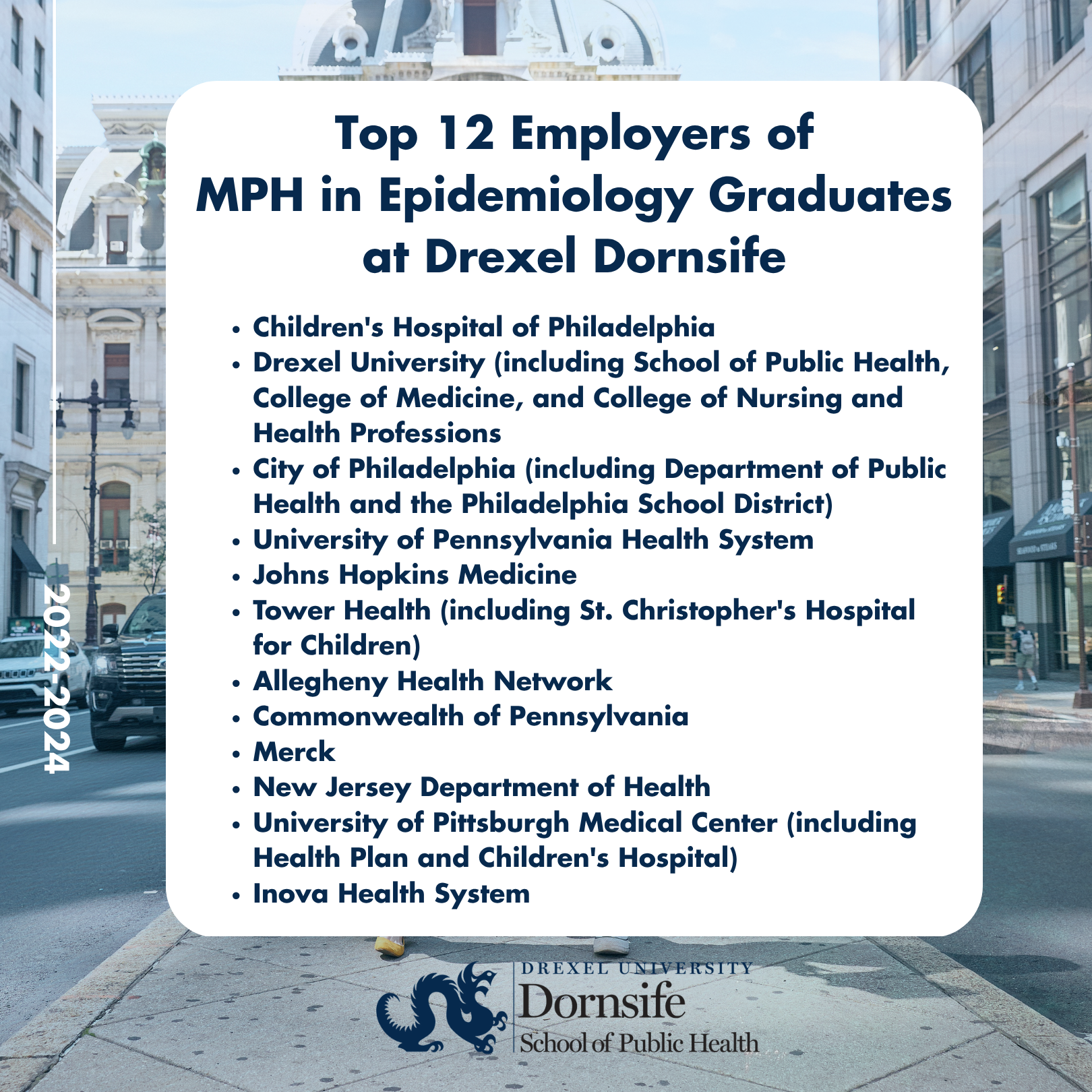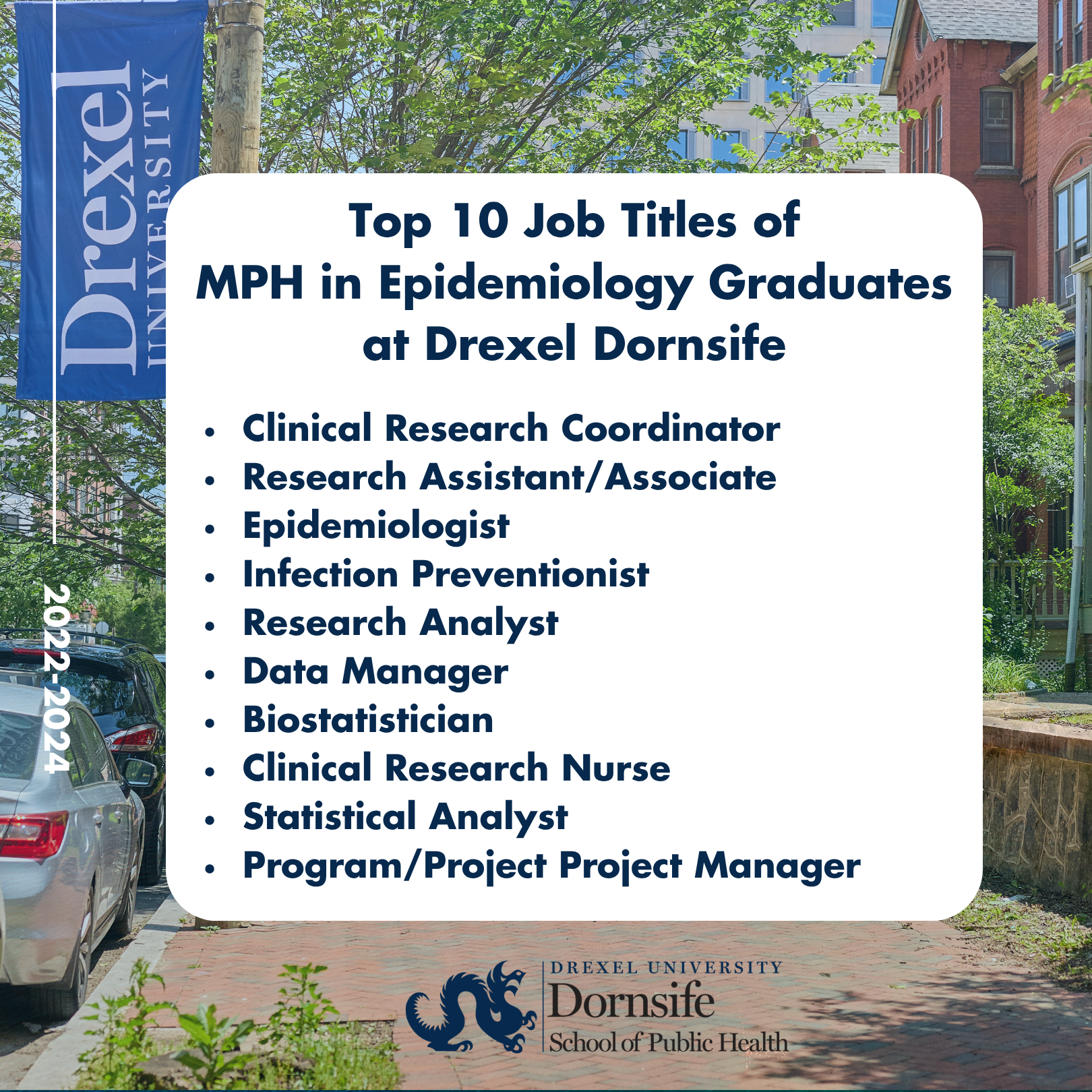The study of epidemiology contributes to evidence-based decision-making that improves health outcomes for communities.
Drexel Dornsife faculty, students, and alumni chose epidemiology as their field of study because of mentors, academic strengths, personal interests, and life experiences.
“I was born in Washington, D.C. where epidemiological problems, chronic disease issues, and social and health inequities are pervasive,” said alum Michael L. Jenkins, Jr., in DSPH Magazine.
“At the age of five, I learned that my grandmother had diabetes, and at the time I could not comprehend the severity of the disease. I later learned of its prevalence in the African American community, and its impact on life quality. I didn’t realize it then, but that knowledge would shape the course of my educational pursuits and career aspirations,” said Jenkins, now a senior policy analyst and social epidemiologist at the U.S. Department of Health and Human Services.
Epidemiologists work in diverse settings, including government agencies and departments (e.g., CDC, Pennsylvania Department of Health), academic institutions, healthcare organizations, and nonprofit organizations.
“In my day-to-day work, I use many of the epidemiology skills that I gained in my major coursework as well as the contextual knowledge that I gained as a Maternal and Child Health trainee,” said Weinbrom, who works as a maternal mortality & morbidity epidemiologist.
An epidemiologist’s skills are extremely relevant to research roles in public health and biomedical sciences. They are also essential for safeguarding public health and managing health crises.
"In my day-to-day work, I use many of the epidemiology skills that I gained in my major coursework as well as the contextual knowledge that I gained as a Maternal and Child Health trainee." - Sarah Weinbrom, MPH ’23, a maternal mortality & morbidity epidemiologist
Places where epidemiologists work include:
- Healthcare organizations and hospitals
- Federal government agencies
- State and local health departments
- International organizations
- Private pharmaceutical and biotech companies
- Colleges and universities
- Environmental and occupational health sectors
- Global and national nonprofit and advocacy organizations
Top 12 Employers of Drexel Dornsife Epidemiology MPH Graduates

How Long Does It Take to Become an Epidemiologist?
The timeline to become an epidemiologist varies depending on the level of specialization and career goals. Below is an overview of the typical time commitment.
Entry-Level Epidemiologist: Typical timeline is 4-6 years
- Bachelor’s degree
- Master’s degree
There are entry-level jobs that do not require a master's degree, but the majority of epidemiology jobs either prefer or require a master's.
Senior Epidemiologist/Researcher: Typical timeline is 9–12 years
- Bachelor’s degree
- Master’s degree
- Doctoral degree in Epidemiology
Drexel Dornsife’s epidemiology program is ranked #18 in the nation according to U.S. News & World Report’s 2025 rankings, making it a top choice for future epidemiologists.
How to Become an Epidemiologist
An MPH in Epidemiology is preferred or required for most epidemiology positions. Further education, such as a doctoral degree in epidemiology, can open more advanced opportunities in research or academia.
A strong foundation in public health and research methods is the key qualification.
With the right education and transferable skills, a wide range of professionals can make a successful career change to epidemiology, including nurses, health educators, pharmacists, and others with a health, science, or data analysis background.
Epidemiologists do not have to go to medical school to enter the field. While some epidemiologists are medical doctors, it is not required for most roles in epidemiology.
There are certain steps required in order to become an epidemiologist. These steps include:
1. Get a Bachelor's Degree in Public Health or a Related Field
The first step to becoming an epidemiologist is to earn a bachelor’s degree. Consider pursuing a college major that provides a strong foundation in science, statistics, and public health. Some good options include a bachelor's in public health, biology, health sciences, mathematics, sociology, and computer science.
A foundational education in health sciences and statistics is essential as you go on to graduate studies in epidemiology.
If you don’t have a degree in a hard science but later decide to become an epidemiologist, then volunteer experience or work (health clinic, health department, or health-related organization) or some pre-requisite courses would be beneficial.
2. Get a Master’s Degree in Epidemiology
Many entry-level epidemiology positions prefer or require a master’s degree. Drexel Dornsife offers a face-to-face MPH in Epidemiology and an online MPH in Epidemiology.
"Of the many MPH programs I considered, Drexel was the only program that I felt would allow me to tailor my degree experience exactly how I wanted." - Marissa Bacon, Online MPH in Epidemiology program
A master’s degree provides specialized training in epidemiological methods, data analysis, and public health principles.
Master’s programs at Drexel Dornsife appeal to students who are looking to control their career path:
“Of the many MPH programs I considered, Drexel was the only program that I felt would allow me to tailor my degree experience exactly how I wanted,” said Marissa Bacon, a student in the MPH in Epidemiology online program and a Dornsife Ambassador.
“Other programs were often too general, but at Drexel I have the opportunity to concentrate my degree in epidemiology while still taking classes that interest me and will help shape my development,” added Bacon.
A doctoral degree is often needed for leadership roles, academia, or advanced research positions in epidemiology. The PhD in Epidemiology involves conducting independent research and writing a dissertation. Learn more about Drexel Dornsife’s epidemiology doctoral students and their experiences.
3. Gain Work Experience
Applicable work experience can help individuals who are aiming to become an epidemiologist. There are different types of ways to gain experience.
Real-world experiences include the MPH applied practice experience, Drexel Co-op, and research assistant roles.
4. Find the Right Role
Individuals with the appropriate education are ready to start applying for epidemiologist jobs.
Drexel Dornsife graduates have landed epidemiology roles including research assistant, data analyst, clinical research coordinator, and infection preventionist.
5. Enhance Your Skills With Continuing Education
Certain epidemiologist roles may require continued education, certification, or job training to stay current on public health practices or increase career possibilities.
Drexel Dornsife faculty and alumni annually attend scientific meetings and conferences through organizations like the Society for Epidemiologic Research and the American Public Health Association.
Are Epidemiologists in Demand?
The job markets in the public, private, and nonprofit sectors have consistently been strong and remain so for individuals with expertise in epidemiologic study design and large-scale data analysis.
The Bureau of Labor Statistics job outlook for epidemiologists is much faster than average, projected to grow 19% between 2023 - 2033.
How Much Do Epidemiologists Make?
According to the Bureau of Labor Statistics, the median pay for epidemiologists with a master’s degree was $81,390 in 2023. An epidemiologist’s salary can be dependent on factors such as job role, education level, and location.

Pursue a Career in Epidemiology with Drexel Dornsife
Pursuing a public health career in epidemiology starts with a degree from an accredited school of public health. Drexel Dornsife provides the education, skills, and practical experience necessary to excel in this field.
Epidemiology degree programs at Drexel Dornsife feature personalized career services, specialized minors, and nationally recognized epidemiology faculty with robust research portfolios in areas including autism, cardiovascular disease, climate change, infectious disease, physical activity, structural racism, and LGBTQ health.
Does epidemiology sound like it might be the right career path for you? Learn more our degrees at Drexel Dornsife School of Public Health:
Take the next step toward becoming an epidemiologist:
Request more information
Apply today